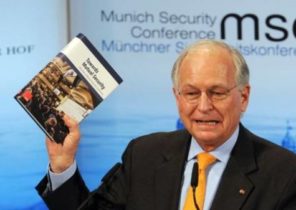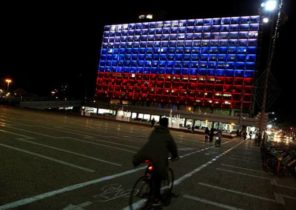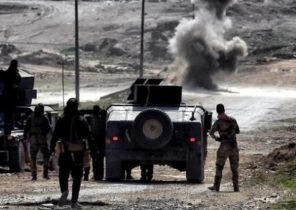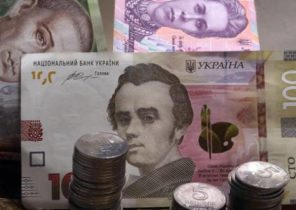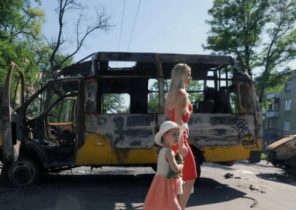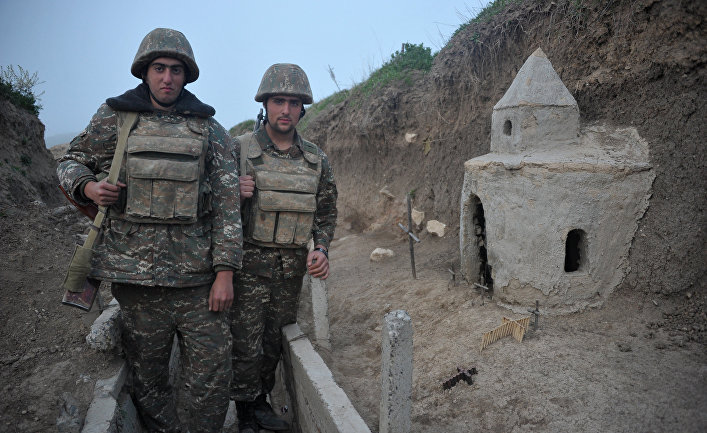
2017-th year from the point of view of conflict resolution began quite actively. At the beginning of the year, the President of Moldova, called for Transnistria, continued negotiations to resolve the Cyprus issue, tensions arose and immediately held talks between Serbia and Kosovo. Against this background, the settlement process of the Karabakh conflict does not demonstrate the trend of progress.
All these meetings were significant. For the first time since 2008 took place the visit of the President of Moldova in Transnistria. It was a gesture from the newly elected Moldovan President, which demonstrates its intention to renew lapsed since 2014 talks and start a direct dialogue with Transnistria.
Interesting also launched in the beginning of the year the negotiations on the settlement of the Cyprus question on the format of direct talks between the heads of the two parts of the island — the Republic of Cyprus and the unrecognized Turkish Republic of Northern Cyprus. In January, the negotiations have not reached an end result, but an agreement was reached to continue the work at the expert level and the resumption of negotiations after the development of joint approaches on a number of issues.
In the beginning of the year, tensions emerged in relations between Kosovo and Serbia, which was described as the most acute crisis in the relations of the parties with the Declaration of independence of Kosovo in 2008. The cause of the crisis was the attempted restoration of the railway route Belgrade — Kosovska Mitrovica has arisen around this controversy. However, under the mediation of the European Union was at once organized a meeting of presidents and Prime Ministers of the two parties in which agreement was reached to continue the series of meetings at the highest level. “We agreed to take a break and try to have a serious talk or not to talk, not to say anything bad about the other side”,- said after the meeting Prime Minister of Serbia Alexander survived.
Despite the difficulties, contradictions and acute problems, in all these conflicts is obvious the will of the parties to go for dialogue, a willingness to peacefully discuss the current issues. And most important, in all the above cases, the parties go to direct negotiations — Moldova, Transnistria, Serbia with Kosovo, and Cyprus with Northern Cyprus.
Alas, cannot the same be said about the Karabakh conflict. The year began on the backdrop of the escalation that occurred in December last year, intermediaries cannot obtain the consent of Azerbaijan on the establishment of confidence-building measures, including the introduction of a mechanism to investigate incidents on the contact line of troops, and the political dialogue is absent. About to sit down at the negotiating table with Nagorno-Karabakh Republic, Azerbaijan and does not want to listen. Instead, from Baku continue to make statements and threats of resumption of war, the impossibility of the independence of Artsakh (Karabakh) and so on.
The main difference of the Karabakh conflict the conflict in the rhetoric and the relationship of the societies of the conflicting parties. In all three cases, there was a constant unimpeded communication between the societies of the two parties, recognized and unrecognized or semi-recognized party, not threats of military reprisals and not embedded hatred against the other side. At that time, Azerbaijan continues implementing anti-Armenian consciousness of their society and the implementation of repression in the relationship of persons and non-governmental organization, cooperating with Armenians.
Armenia and Artsakh always stress the importance of peaceful settlement of the conflict, the desire and intention to live peacefully next to each other. Armenian President in his speeches always stressed that he does not consider the people of Azerbaijan are hostile people. Dilijan, during the opening of the international school of Armenia Serzh Sargsyan stated: “I frankly wish that this school also studied and Azerbaijani students. I am sure that this day would come, and I want the day as soon as possible”. In addition, in his speeches often repeat expressions like “for the Armenian people not the enemy of the people”, “our people are waiting for a better future than is predicted by some of the leaders spreading the propaganda of war and hatred” and so on.
The Armenian authorities have always insisted that the people of Artsakh (Karabakh) should decide their future. This means that not only the status of Karabakh should be determined by the results of will of the Karabakh society, but the Karabakh side should immediately fully participate in the negotiations. Azerbaijan thwarts one or the other.
All this shows that, despite the long efforts of the Armenian side and expressed the readiness of the authorities of Armenia and Artsakh, the Azerbaijani authorities are not ready to a constructive dialogue, you do not have sufficient political will to sit down at the negotiating table with Artsakh and to reach a political settlement of the Karabakh conflict.
The words of the Prime Minister of Serbia about the fact that you don’t need to say anything bad about the other hand, is more than appropriate for Azerbaijan. While the official Baku does not have sufficient political will, it is difficult to draw Parallels with European experiences of conflict resolution and talking about the possibility of borrowing from their experience. Today, Serbia, and Moldova, and Cyprus is ready to sit at the table negotiations with the other, unrecognized or semi-recognized party to the conflict, while Azerbaijan threatens renewed war, and to spread hatred towards Armenians. And would be more than logical if the international community drew the attention of Azerbaijan on this issue.
